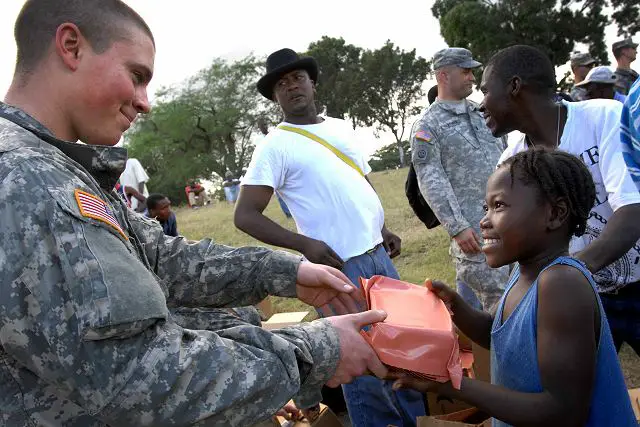Breaking news
United States to provide more support to United Nations Peace Operations 12909151.
|
|
|||
|
Defence & Security News - United States
|
|||
|
|
|||
| United States to provide more support to United Nations Peace Operations. | |||
|
The United States will provide much more support to U.N. peacekeeping efforts, President Barack Obama said September 28, 2015, at the United Nations in New York. As the president spoke to the U.N. General Assembly, the White House released a memo he signed pledging more support to United Nations Peace Operations.
|
|||
|
|
|||
 Soldiers with the 82nd Airborne Division provide survivors of the Haiti earthquake with food and water, Jan. 16, 2010. The Army Peacekeeping and Stability Operations Institute was founded 20 years ago to provide doctrine and lessons learned for such humanitarian assistance missions. Soldiers with the 82nd Airborne Division provide survivors of the Haiti earthquake with food and water, Jan. 16, 2010. The Army Peacekeeping and Stability Operations Institute was founded 20 years ago to provide doctrine and lessons learned for such humanitarian assistance missions. |
|||
|
|
|||
|
In the memo, the president said he will “strongly consider” providing military, police and civilian personnel to support or participate in U.N. peace operations. There are caveats. The direct personnel support would happen only if the need is in a capability in which the United States has specialized expertise and only if U.S. personnel provide the potential to improve substantially the overall effectiveness of the U.N. mission. The deployment cannot adversely impact current or projected U.S. operations elsewhere. The president would not relinquish command of any U.S. forces deployed to peacekeeping operations, the memo says, but it notes that as commander in chief, he has the authority to place U.S. forces under the operational control of a foreign commander when doing so serves U.S. national security interests. Libya, Syria and Somalia are examples of failed states, and there are dozens of fragile and conflict-affected states. “Their numbers are now rising globally, and may continue to do so over the next decade or more,” the president said in the memo. “Left unassisted, many of these fragile states, where conflict festers and development stagnates, could become hosts of violent extremism; afford safe havens that transnational terrorists and criminals exploit; generate large flows of refugees and displaced persons that can destabilize neighboring countries and sow regional instability; create humanitarian emergencies; facilitate the spread of pandemic disease; and increase the risk of mass atrocities.” The peacekeeping operations span the spectrum of conflict prevention, peacemaking, and peacebuilding interventions authorized by the U.N. Security Council. United Nations peace operations have now reached all-time high levels of cost, complexity and risk. The U.N. currently manages 16 peacekeeping missions, with more than 100,000 uniformed personnel and more than 19,000 civilian staff deployed globally. The U.N. also currently has 11 field-based political missions and peace-building support offices in Africa, the Middle East and Central Asia. |
|||



















